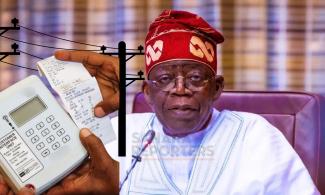…Targets 2.7 million barrels per day oil output by 2027
By Charles Ebi
Federal Government has denied reports suggesting an imminent 65% increase in electricity tariffs, clarifying that its focus remains on improving power supply, ensuring targeted subsidies, and expanding metering nationwide.
Olu Arowolo Verheijen, Special Adviser to the President on Energy, made this clarification in a statement posted on her LinkedIn page on Monday.
She stated, “It has become necessary to clarify media reports suggesting an imminent 65% increase in electricity tariffs. This is a misrepresentation of what I actually said in a recent press interview. I highlighted the fact that, following the increase in Band A tariffs in 2024, current tariffs now cover approximately 65% of the actual cost of supplying electricity, with the Federal Government continuing to subsidize the difference%.
Verheijen emphasized that while the government is committed to ensuring fairer pricing over the long term, its immediate focus is on increasing electricity supply, reducing outages, and protecting vulnerable Nigerians.
“Today, the Federal Government spends over N200 billion per month on electricity subsidies, but much of this support benefits the wealthiest 25% of Nigerians rather than those who truly need assistance.
To address this, the Federal Government is working towards a targeted subsidy system to ensure that low-income households receive the most support. This approach will make electricity more affordable and accessible for millions of hardworking families”, she added.
One of the significant reforms in the power sector is the Presidential Metering Initiative, which aims to roll out 7 million prepaid meters nationwide starting this year.
She stated, “This will finally put an end to the practice of estimated billing, giving consumers confidence in what they are paying for and ensuring transparency in electricity charges”.
According to Verheijen, this initiative will eliminate estimated billing, provide transparency in electricity charges, and restore consumer confidence.
“Metering will also improve revenue collection across the sector and attract the investments needed to strengthen Nigeria’s power infrastructure”, she noted.
She further noted “To address this, the Federal government is working towards a targeted subsidy system to ensure that low-income households receive the most support. This approach will make electricity more affordable and accessible for millions of hardworking families”.
In her statement, she said, in addition to addressing the tariff concerns, the Federal Government will be implementing fiscal incentives, including VAT and Customs Duty Waivers, to lower the cost of alternative power sources such as Compressed Natural Gas ,CNG, and Liquefied Petroleum Gas ,LPG.
These initiatives, she notes, align with the government’s commitment to ensuring that power sector reforms translate into tangible benefits for Nigerians.
“Every policy is designed with the Nigerian people in mind eliminating unfair estimated billing, ensuring that subsidies benefit the right people, and creating the conditions for stable, affordable electricity”, Verheijen reiterated.
In a similar vein, Nigeria, has set a target of boosting daily production by 2.7 million barrels of crude and condensate by 2027.
She noted that improved security around oil production and transportation sites is the key factor that supports the increase in output.
Verheijen emphasized that the increase will be driven in part by oil condensate, a lighter more volatile hydrocarbon which allows Nigeria to remain largely within its OPEC+ crude oil quota of 1.5 million barrels per day.
“The OPEC quota does not include condensate. The target we’ve set for ourselves is a combination of condensate and crude”, she said in an interview at an energy conference in Dar es Salaam, Tanzania last week, “The idea is to try and demonstrate the capacity for a higher quota as required”,she stated
The special adviser noted that Nigeria’s oil production has risen from a low of 1.1 million bpd in 2022 as the country seeks to boost revenue to address economic challenges like poverty and deteriorating infrastructure.
In December 2024, crude oil production reached 1.67 million barrels per day while 1.48 million barrels were crude.
Nigeria is projected to become a net exporter of petroleum products as Aliko Dangote’s refinery scales up production.
According to Verheijen, the removal of fuel subsidies has revitalized the downstream sector, making it commercially viable for the first time in decades. “The removal of fuel subsidy could also foster further investment in refineries.
“What that has done is allowed the downstream, mainstream downstream of that sector to now become commercially viable for the first time in decades”, she said.
She added that investments in refineries are now viable due to improved commercial viability in the downstream sector.
Recently, President Bola Tinubu pledged to boost Nigeria’s crude oil production from under 1.5 million barrels per day to over 2 million bpd in 2025. However, some experts have dismissed the target as unrealistic.
Petroleum Engineer and Oil & Gas Analyst, Dr Bala Zakka, stated that while Nigeria has the capacity to increase production, reaching the 2025 target is unlikely due to ongoing crude oil theft in the Niger Delta and the continued exit of International Oil Companies ,IOCs, from onshore exploration.
As of November 2024, Nigeria’s crude oil production experienced a slight decline in October 2024, dropping from 1.54 million barrels per day ,bpd, to 1.53 million bpd.





